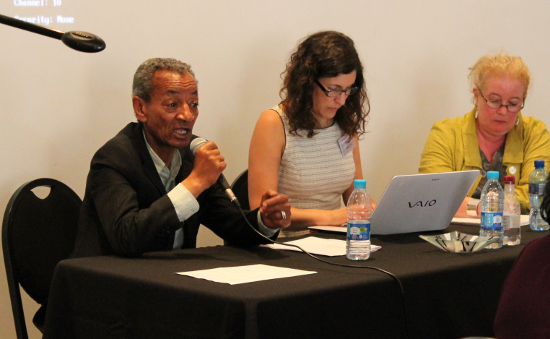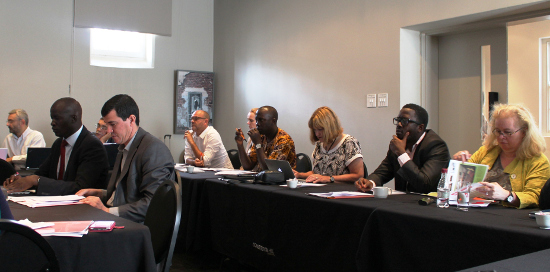|
31 January 2014
Memorialising human rights for Africa – report on AUHRM consultation
The African Union Human Rights Memorial (AUHRM) consultation was held at Constitution Hill on the 28 and 29 January 2014 which was attended by members of staff from SAHA. It brought together various memorial institutes from Africa to discuss a human rights memorial, focused specifically on atrocities that occurred in Africa. AUHRM has four key events that it addresses: The Rwandan genocide, Apartheid in South Africa, Ethiopian Red Terror (1977-79) and colonialism and the slave trade. The memorial will not be limited to these atrocities but will also link countries in Africa who have experienced similar human rights violations.

This was the fifth consultation in a series of meetings that took place throughout the continent. The meeting in Johannesburg focused on how the memory of Apartheid should be represented by the memorial. Discussion also centred on current problems regarding memorialisation and how AUHRM could make a positive contribution to memorialisation in South Africa. The final discussion topic addressed how AUHRM could positively promote human rights in the African Union (AU) and Southern Africa.
The aim of the meeting was to setup a framework for creating a memorial that could collectively represent the atrocities that took place and also connect Africa through shared experiences. Many suggestions were made to the AU regarding the memorial. Most importantly was that the memorial should be driven by civil society, and highlight the individual stories of people who have suffered. Some of the civil society organisations in attendance were, the African Youth Initiative network (AYINET) from Uganda, the Sierra Leone Peace Museum and a host of other organisations from Libya, Egypt and Tunisia.
 There was also strong advocacy for sustainable educational programming on human rights in schools. A presentation was made by both the District Six Museum and Constitution Hill highlighting the importance of memorialisation and education. Catherine Kennedy, the SAHA Director, noted: "This focus of education was particularly welcomed by SAHA. Using historical materials from our archives to enable young people to deepen their understanding of human rights and responsibilities and how they can contribute in the making of democracy in South Africa has been a key component of SAHA's archival outreach programme for a number of years. By extension, we are firmly committed to the idea that education must be a core component of any consideration of memorialising human rights struggles in Africa." There was also strong advocacy for sustainable educational programming on human rights in schools. A presentation was made by both the District Six Museum and Constitution Hill highlighting the importance of memorialisation and education. Catherine Kennedy, the SAHA Director, noted: "This focus of education was particularly welcomed by SAHA. Using historical materials from our archives to enable young people to deepen their understanding of human rights and responsibilities and how they can contribute in the making of democracy in South Africa has been a key component of SAHA's archival outreach programme for a number of years. By extension, we are firmly committed to the idea that education must be a core component of any consideration of memorialising human rights struggles in Africa."
|






 There was also strong advocacy for sustainable educational programming on human rights in schools. A presentation was made by both the
There was also strong advocacy for sustainable educational programming on human rights in schools. A presentation was made by both the